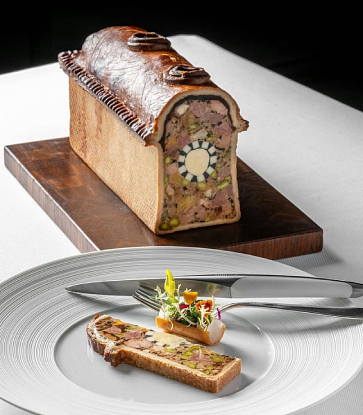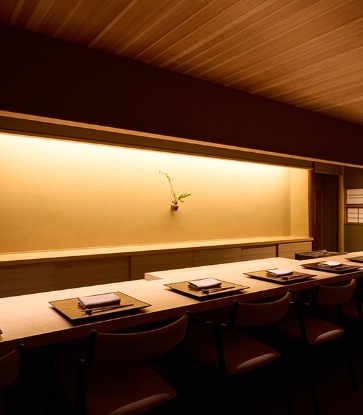In large firms and organisations, ‘customer service’ can sometimes be seen as just another department, one largely charged with dealing with the fallout from failed processes or questionable company decisions. In reality, it should be the sine qua non of the entire company. The restaurant industry is one that does put service front and centre, which is why it can teach the wider business community a thing or two.
It doesn’t matter if a restaurant is formally run or casual, whether its staff wear ties or T-shirts, dinner jackets or dungarees, the central tenets of good service are universal:
FIRST IMPRESSIONS
A good restaurant understands that their customers start forming an impression of it the moment they make contact. Outdated information on a website or an overly complicated booking system can leave them feeling frustrated long before they’ve even turned up for dinner. Then there’s the first moment of human contact which will hopefully be accompanied by something a little more welcoming than “Have you got a reservation?” As an inspector I’ve been walking into restaurants twice a day for many years and the one thing I want more than anything is for the receptionist/host/manager to make eye contact and smile at me. It’s as basic as that: a warm, welcoming smile.
LAST IMPRESSIONS
Lots of organisations work hard on that initial hello – but fail to consider the goodbye. A good restaurant understands that there’s nothing more dispiriting than a customer paying their bill and then walking the length of the restaurant on their way out without a single member of staff acknowledging that they’re leaving and have just parted with a fair slice of their hard-earned lolly. We all liked to be thanked for our custom; to feel that the establishment or business is grateful that we chose them over one of their competitors.

LOYALTY
The hardest part for any business is getting customers to try their product for the first time – they shouldn’t then throw that away by not encouraging them to return. Humans are fundamentally loyal creatures; many people keep a roster of 3 or 4 restaurants – one for a quick midweek bite, one for meeting up with friends, one for a celebration, etc – and will remain loyal to those restaurants until one of them messes up and they replace it with another. But no one will be loyal to an organisation until that organisation shows some loyalty to them. Not long ago I walked into a restaurant (remember those days?) behind a couple to witness them being greeted with “Hello Mr & Mrs Smith, lovely to see you. We’ve got you that table you like today” – the brightness of their smiles could have cooked the steaks. No one who considers themselves a regular wants to be greeted with a desultory “Been here before?” Customers want to feel a sense of ownership when it comes to their regular haunts – to feel they belong. Rewarding and recognising that loyalty will always pay dividends.
RECRUITMENT
Experience isn’t everything when it comes to service staff. It may be easier to hire someone who has experience and so requires less training but sometimes those without prior experience may have just the perfect personality to fit the organisation. A business can train someone to do a great job; it can’t train someone to have a great personality – and while there will always be some restaurants who hire receptionists for reasons of pulchritude rather than attitude, a naturally warm, friendly, enthusiastic person with a sunny disposition will always be an asset to a company in the service industry.
“No one who considers themselves a regular wants to be greeted with a desultory 'Been here before?'”
PRODUCT KNOWLEDGE & TEAMWORK
All good servers know their menu inside out. They can answer questions from customers and volunteer relevant information to help those customers come to a decision. Even if they’re stumped by a question, a good server knows not to try to blag their way out of it and will instead say “I’m sorry, I don’t know. I’ll go ask someone and be right back”. A lot more restaurants are now involving chefs in the service angle; they may require a little nudge to move from their kitchen but it means that they’ll develop more of an appreciation of the challenges that service staff face – along with the added benefit of receiving instant feedback from those for whom they cook. A good restaurateur will also let all staff gain a wider knowledge of the business as a whole, by taking them out to see where the beef comes from, or to meet the person who grows the vegetables, etc.

LISTENING
As a guide we try to avoid eating in a new restaurant until it has bedded in – that means allowing it time to listen to feedback from its customers and to react to it. Quite often the way a restaurant feels or the style of service it has chosen may subtly change after a few months. A more informal style of service, for example, may be adopted after feedback from the customer or a more structured style of wine service. So when a server comes to the table and asks “How is everything?” they understand this is not a rhetorical question and that they should actually wait for an answer.
EMPOWERING STAFF
Things do – and always will – go wrong, but the issue is how they are dealt with. Some of my best moments in restaurants have been when something went awry but the restaurant dealt with it in such a considerate and caring way I left feeling even greater warmth towards them. As a customer you can always tell when a member of staff who’s dealing with you feels a sense of ownership, a sense of pride in their role and their establishment, and is eager to ensure things go smoothly or to put them right if they don’t. A good restaurant trusts their service team to use their good judgement in dealing immediately with any situation.
“Things do – and always will – go wrong, but the issue is how they are dealt with.”
BEING BUSY
Good restaurants know that being busy is no excuse for poor service. Actually, we as inspectors tend to have our best meals and the best service when restaurants are busy because then the restaurant has a certain energy and everyone only has time to focus on their immediate job. When things are quiet – a cold Tuesday in February with three tables in for lunch – that’s the real challenge. A good manager will understand this and act accordingly.
AIMING HIGH
"A satisfied customer — we should have him stuffed" said Basil Fawlty but a customer being merely “satisfied” doesn’t sound like a great ambition. MICHELIN Stars may be awarded solely for the quality of the cooking but restaurants are nothing without their people. Whatever the cooking, whatever the ‘product’, it is the service staff who can really make or break the experience. Staff who anticipate, understand and surpass their customers’ needs and expectations are the ones we remember.
KNOWING YOUR CUSTOMERS AND BEING KNOWN
Some people end up having a mediocre time in a restaurant that is no fault of the restaurant itself but simply because they picked the wrong one. It may be too formal, too casual, too loud, too quiet for their occasion – we’d all choose different restaurants for a 90th birthday celebration and a 21st. A restaurant can’t be all things to all people – and if it tries to be it will probably fail; a good restaurant knows what style of restaurant it is and then tries to be the best it can at being that restaurant.
“The job of a restaurant guide is to not only point out restaurants with great cooking but also to steer the right customers to the right restaurant for the right occasion.”
Many firms spend huge amounts of time and money winning new customers but the hospitality industry shows the importance of also looking after existing ones. A restaurant with great service knows how to make its customers feel happy; it understands the importance of being flexible; it takes an interest in its customers and knows how to make them feel special. Any business that treats its consumers or its customers more like valued guests will reap the benefit in the long run.
Restaurants are joyous places – that’s why we’re all missing them so much at the moment.
When this crisis is over, the first restaurant most people will choose will be the one where they know its staff will smile at them when they walk in and say “Welcome back”.





















